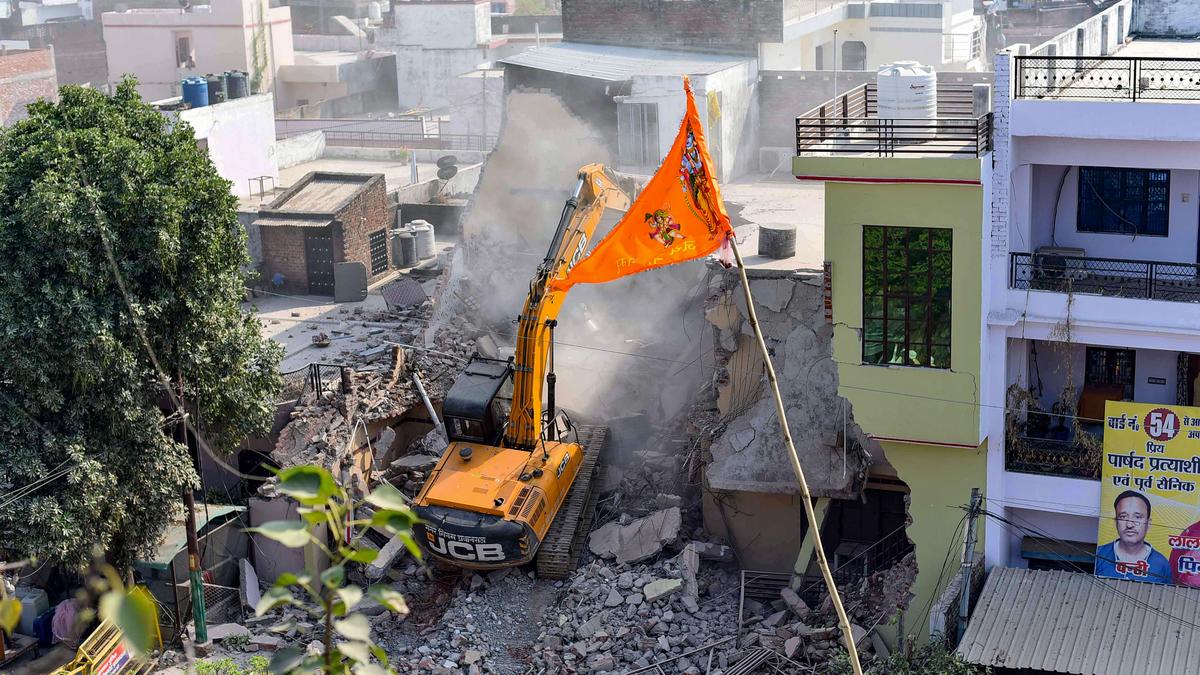 |
|
The Supreme Court's ruling regarding the demolitions carried out by the Prayagraj Development Authority (PDA) in Uttar Pradesh in 2021 has sparked significant political backlash and calls for stricter regulations to prevent future injustices. The opposition parties have seized upon the court's order, which mandates compensation of ₹10 lakh to each of the five affected homeowners, as evidence of the U.P. BJP government's disregard for the rule of law and due process. This incident highlights the contentious issue of government-led demolitions, particularly their potential to disproportionately impact vulnerable communities and individuals. The case underscores the critical role of the judiciary in safeguarding citizens' rights and ensuring accountability within the administrative machinery. The court's strong condemnation of the demolitions as 'high-handed' and a violation of basic legal principles serves as a potent reminder of the need for transparency, fairness, and adherence to established procedures in all government actions. It also brings to the forefront the emotional and psychological toll that such actions can inflict on individuals and families, a factor that, as Akhilesh Yadav pointed out, cannot be adequately compensated by monetary means alone. The demand for stricter regulations and time-bound remedies reflects a broader concern about the potential for abuse of power and the urgent need for robust mechanisms to protect citizens from arbitrary actions by state authorities. The incident is further complicated by the fact that the Allahabad High Court did not initially order any compensation, prompting the affected individuals to seek recourse in the Supreme Court. This highlights the challenges that ordinary citizens face in navigating the legal system and underscores the importance of ensuring access to justice at all levels. The opposition parties have effectively used this case to amplify their criticism of the U.P. government's policies and practices, positioning themselves as champions of the marginalized and advocates for the rule of law. The issue of demolitions is likely to remain a contentious one in Uttar Pradesh, particularly in the lead-up to future elections, as opposition parties seek to capitalize on public discontent and hold the government accountable for its actions.
The political ramifications of the Supreme Court's order extend beyond the immediate context of the Prayagraj demolitions. The incident has become a focal point for broader debates about governance, accountability, and the protection of citizens' rights in Uttar Pradesh. Opposition parties are leveraging the case to highlight what they perceive as a pattern of discriminatory actions targeting specific communities. The Congress party's call for the apex court to initiate regulations preventing unjust actions and to ensure effective, time-bound remedies reflects a deep-seated concern about the potential for abuse of power by the state. This concern is further amplified by the allegation that the Allahabad High Court did not initially order any compensation, suggesting a potential lack of adequate redress at the lower levels of the judicial system. The Supreme Court's intervention in this case underscores its crucial role as a guardian of constitutional principles and a protector of citizens' rights against arbitrary state action. The court's strong condemnation of the demolitions as 'high-handed' and a violation of basic legal principles sends a clear message to government authorities that they must adhere to due process and respect the fundamental rights of all citizens. The case also highlights the challenges that ordinary citizens face in navigating the legal system and seeking justice against powerful state actors. The opposition parties' focus on this issue is likely to resonate with a significant segment of the population, particularly those who feel marginalized or vulnerable to government actions. The issue of demolitions is also likely to become a key point of contention in future elections, as opposition parties seek to mobilize public opinion and hold the government accountable for its policies and practices. The Supreme Court's order serves as a powerful reminder of the importance of checks and balances in a democratic system and the need for robust mechanisms to prevent abuse of power.
The legal implications of the Supreme Court's order are equally significant. The court's decision to mandate compensation for the affected homeowners sets a precedent for future cases involving government-led demolitions. It also underscores the importance of adhering to proper legal procedures and providing adequate notice before carrying out such actions. The court's strong condemnation of the demolitions as 'high-handed' and a violation of basic legal principles reinforces the principle that all government actions must be consistent with the rule of law and respect the fundamental rights of citizens. The case also highlights the potential for government authorities to be held liable for damages caused by their actions. The Supreme Court's intervention in this case serves as a reminder that the judiciary plays a crucial role in ensuring accountability within the administrative machinery. The court's decision to award compensation to the affected homeowners sends a clear message to government authorities that they cannot act with impunity and that they will be held accountable for any violations of citizens' rights. The case also highlights the importance of access to justice for all citizens, regardless of their social or economic status. The fact that the affected homeowners were able to seek recourse in the Supreme Court demonstrates the availability of legal remedies for those who have been wronged by government actions. The Supreme Court's order is likely to have a significant impact on future government policies and practices regarding demolitions. Government authorities will be more cautious about carrying out such actions and will be more likely to adhere to proper legal procedures and provide adequate notice to affected individuals. The case also serves as a reminder of the importance of transparency and accountability in government decision-making. The Supreme Court's order is a victory for the rule of law and a testament to the importance of an independent judiciary in protecting citizens' rights.
Source: Opposition hail SC order on demolitions in U.P., push for strict regulations
